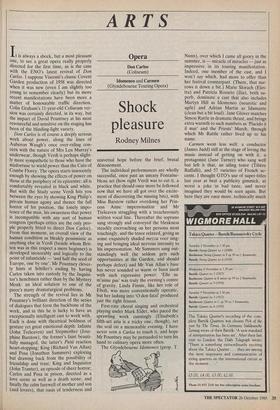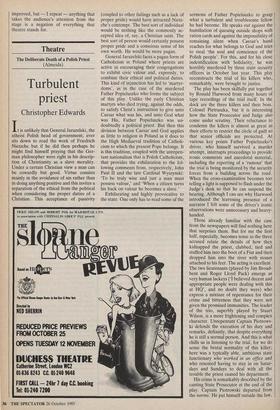ARTS
Opera
Don Carlos (Coliseum)
Idomeneo and Carmen (Glyndebourne Touring Opera)
Shock pleasure
Rodney 114dnes
It is always a shock, but a most pleasant one, to see a great opera really properly directed for the first time, as is the case with the ENO's latest revival of Don Carlos. I suppose Visconti's classic Covent Garden production of 1958 was directed when it was new (even I am slightly too young to remember clearly) but its more recent manifestations have been more a matter of honourable traffic direction. Colin Graham's 11-year-old Coliseum ver- sion was certainly directed, in its way, but the impact of David Pountney at his most resourceful and sensitive on the staging has been of the blinding-light variety.
Don Carlos is of course a deeply serious work about power, along the lines of Auberon Waugh's once over-riding con- cern with the nature of Mrs Len Murray's underwear, though Verdi is perhaps slight- ly more sympathetic to those who have the misfortune to wield power than the Cato of Combe Florey. The opera starts innocently enough by showing the effects of power on those at the periphery of its epicentre: all is comfortably revealed in black and white. But with the Study scene Verdi hits you between the eyes by showing King Philip's private human agony and thence the full horror of his position, the lonely impo- tence of the man, his awareness that power is incompatible with any sort of human congress (perhaps critics are the only peo- ple properly fitted to direct Don Carlos). From that moment, an overall view of the human condition as bleakly pessimistic as anything else in Verdi (beside whom Brit- ten was in this respect a mere beginner) is developed inexorably and logically to the point of infanticide — 'and half the seed of Europe, one by one'. Mr Pountney clever- ly hints at Schiller's ending by having Carlos taken into custody by the Inquisi- tor's henchmen rather than by the Mystery Monk: an ideal solution to one of the piece's many dramaturgical problems.
The strength of the revival lies in Mr Pountney's brilliant direction of the series of dialogues that form the backbone of the work, and in this he is lucky to have an exceptionally intelligent cast to work with. Each is done with theatrical boldness of gesture yet great emotional depth: Infante (John Treleaven) and Stepmother (Jose- phine Barstow), the former's faint beauti- fully managed, the latter's Pieta reaction heart-stopping; King (Richard Van Allan) and Posa (Jonathan Summers) exploring but drawing back from the possibility of friendship and trust; King and Inquisitor (John Tranter), an episode of sheer horror; Carlos and Posa in prison, directed as a love scene as well as a death scene; and finally the calm farewell of mother and son (and lovers), that oasis of tenderness and universal hope before the brief, brutal denouement.
The individual performances are wholly successful, once past an uneasy Fontaine- bleau act (how right Verdi was to cut it, a practice that should once more be followed now that we have all got over the excite- ment of discovering the missing bits), with Miss Barstow rather overdoing her Prin- cess Anne impersonation and Mr Treleaven struggling with a treacherously written vocal line. Thereafter the soprano sang strongly and conveyed the bleakness steadily encroaching on her persona most touchingly, and the tenor relaxed, giving us some exquisitely shaded mezza voce sing- ing and bringing ideal nervous intensity to his impersonation. Mr Summers sang out- standingly well (he seldom gets such opportunities at the Garden, and should perhaps defect) and Mr Van Allan's bass has never sounded so warm or been used• with such expressive power: 'Elle ne m'aime pas' was truly the evening's centre of gravity. Linda Finnie, like her role of Eboli, was more conventionally operatic, but her lashing into '0 don fatal' produced just the right frisson.
First-rate choral singing and orchestral playing under Mark Elder, who paced the sprawling work cunningly (Elisabeth's fifth-act aria is a tricky one, though), set the seal on a memorable evening. I have never seen a Carlos to touch it, and hope Mr Pountney may be persuaded to turn his hand to culinary opera more often. The Glyndebourne Idomeneo (prop. T. Nunn), over which I came all gooey in the summer, is — miracle of miracles — just as impressive in its touring manifestation. Indeed, one member of the cast, and I won't say which, had more to offer than her festival counterpart. (There, that nar- rows it down a bit.) Marie Slorach (Elet- tra) and Patricia Rozario (Ilia), both su- perb, dominate a cast that also includes Martyn Hill as Idomeneo (neurotic and agile) and Adrian Martin as Idamante (clean but a bit loud). Jane Glover matches Simon Rattle in dramatic thrust, and brings extra warmth to such numbers as 'Placido e it mar' and the Priests' March, through which Mr Rattle rather lived up to his name.
Carmen went less well: a conductor (James Judd) still at the stage of loving the music instead of getting on with it, a protagonist (Jane Turner) who sang well but left it that, an ailing tenor (Tibere Raffalli), and 57 varieties of French ac- cents. I thought GTO's use of super-titles last year at best a publicity gimmick, at worst a joke in bad taste, and never imagined they would be seen again. But here they are once more, technically much improved, but — I repeat — anything that takes the audience's attention from the stage is a negation of everything that theatre stands for.



























































 Previous page
Previous page